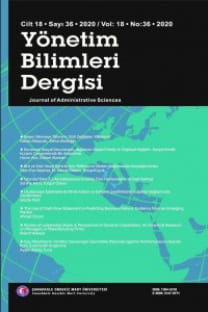Relationship Between Knowledge Economy Performance Indicators And Selected Macroeconomic Variables: an Application for OECD Countries
Knowledge Economy, Information and Communication Technologies (ICT), Canonical Correlation Analysis
___
- REFERENCES
- Amiri, Shahram and Reif, Brian, “Internet Penetration and its Correlation to Gross Domestic Product: An Analysis of the Nordic Countries”, International Journal of Business, Humanities and Technology, Vol. 3, No. 2, 2013, pp. 50-60.
- Billon, Margarita, Lera-Lopez Fernando and Marco, Rocio, “Differences in Digitalization Levels: A Multivariate Analysis Studying the Global Digital Divide”, Review of World Economics, Vol. 146, No. 1, 2010, pp. 39-73.
- Beilock, Richard and Dimitrova, Daniela V., “An Exploratory Model of Inter-Country Internet Diffusion”, Telecommunications Policy, Vol. 27, 2003, pp. 237–252.
- Boshkin, Micheal J., Lau, Lawrence J., “Generalized, Solow – Neutral Technical Progress and Postwar Economic Growth”, NBER Working Paper No:8023, 2000, pp.1-39.
- Colecchia, Alessandra and Schreye, Paul (2002), “Ict Investment and Economic Growth in the 1990s: Is The United States A Unique Case? A Comparative Study of Nine OECD Countries”, STI Working Paper, 2002, pp.1-31.
- Dewan, Sanjeev and Kraemer, L. Kenneth, “Information Technology and Productivity: Evidence From Country-Level Data”, Management Science, Vol. 46, No. 4, 2000, pp. 548-562.
- Drucker, Peter F., Kapitalist Ötesi Toplum, İnkılap Kitabevi, İstanbul, 1993.
- Erkekoğlu, Hatice ve Arıç, K. Halil, “APEC Ülkeleri ve Türkiye’nin Bilgi Toplumu Kriterleri Açısından İstatistiksel Analizi ve Bazı Tespitler”, Bilgi Ekonomisi ve Yönetimi Dergisi, Vol. 8, No. 1, 2013, pp. 103-114.
- Falk, Martin, “R&D Spending in the High-tech Sector and Economic Growth”, Research in Economics, Vol. 61, 2007, pp.140-147.
- Hargittai, Eszter, “Weaving the Western Web: Explaining Differences in Internet Connectivity Among OECD Countries”, Telecommunications Policy, Vol. 23, No. 10–11, 1999, pp. 701–718.
- Jin, Sangki and Cheong Moon Cho, “Is ICT a New Essential for National Economic Growth in an Information Society?” Government Information Quarterly, Vol. 32, 2015, pp. 253-260.
- Johnson, Richard A. and Wichern Dean. W., Applied Multivariate Statistical Analysis, 4th ed., Prentice-Hall Inc., Upper Saddle River, New Jersey 1998.I NISTRY OF DEVELOPMENT Kamara, Abdul B., Bourish, Lobna and Nyende, Magidu, “Growing a Knowledge Based Economy: Evidence from Public Expenditure and Education in Africa”, Economic Research Working Paper, No: 88, African Development Bank, 2007, pp. 1-31.
- Kiiski, Sampsa and Pohjola Matti, “Cross-country Diffusion of the Internet”, Information Economics and Policy, Vol. 14, No. 2, 2002, pp. 297–310.
- Koski Heli, Rouvinen Petri and Yla-Anttila Pekka, “ICT Clusters in Europe the Great Central Banana and the Small Nordic Potato”, Information Economics and Policy, Vol. 14, 2002, pp.145–165.
- OECD, “The Knowledge-Based Economy”, OECD/GD(96)102, Paris, 1996.
- OECD, “New Sources of Growth: Knowledge-Based Capital Key Analyses and Policy Conclusions”, Synthesis Report, 2013.
- O'Mahony Mary and Vecchi, Michela (2005), “Quantifying the Impact of ICT Capital on Output Growth: A Heterogeneous Dynamic Panel Approach”, Economica, Vol. 72, No. 288, 2005, pp. 615-633.
- Oort Frank G. Van, Oud, Johan H. L. and Raspe Otto, “The Urban Knowledge Economy and Employment Growth: a Spatial Structural Equation Modeling Approach”, The Annals of Regional Science, Vol. 43, 2009, pp. 859-877.
- Özdamar, Kazım, Paket Programlar ile İstatistiksel Veri Analizi, 5. Baskı, Kaan Kitabevi, Eskişehir, 2004.
- Pick, James B. and Azari, Rasool, “Global Digital Divide: Influence of Socioeconomic, Governmental, and Accessibility Factors on Information Technology”, Information Technology for Development, Vol. 14, No. 2, 2008, pp. 91-115.
- Pohjola, Matti, “Information Technology and Economic Growth: A Cross-Country Analysis”, United Nations University / World Institute for Development Economics Research (UNU/WIDER) Working Papers, No: 173, January 2000.
- Powell, Walter W. and Snellman Kaisa (2004), “The Knowledge Economy”, Annu. Rev. Sociol, Vol. 30, 2004, pp.199-220.
- Republic of Turkey Ministry of Development, “2015-2018 Bilgi Toplumu Stratejisi ve Eylem Planı”, Ankara, 2015.
- Sharma, Subhash, Applied Multivariate Techniques, John Wiley & Sons, Inc., New York, 1996.
- Stewart Douglas and Love William, “A general canonical correlation index”, Psychological Bulletin, Vol 70 (3, Pt.1), 1968, pp. 160-163.
- Suh, Joonghae and Chen, Drek H. C., Korea as a Knowledge Economy, Korea Development Institute and World Bank Institute, Washington DC, 2007.
- Taşçı, Kamil (2013), “Bilgi ve İletişim Teknolojileri Sektörünün Girdi-Çıktı Analizi Yöntemiyle Türkiye Ekonomisi Açısından Önemi”, Akademik Bakış Dergisi, Vol. 34, 2013, pp. 1-20.
- Tatlıdil, Hüseyin, Uygulamalı Çok Değişkenli İstatistik Analiz, Ziraat Matbaacılık A.Ş., Ankara, 2002. Yamak, Rahmi ve Koçak, Necmettin Alpay, “Bilgi Teknolojisi Harcamalarının Ekonomik Büyüme Üzerine Etkileri: 1993-2005”, Bilgi Ekonomisi ve Yönetimi Dergisi, Vol. 2, No. 1, 2007, pp. 1-10. Wong, Poh-Kam (2002), “ICT Production and Diffusion in Asia: Digital Dividends or Digital Divide Information Economics and Policy, Vol. 14, No. 2, 2002, pp. 167–187.
- World Bank (2012), http://knoema.ru/atlas/sources/WB?topic=World-Rankings.
- World Economic Forum, “ICT for Economic Growth: Adynamic Ecosystem Driving The Global Recovery”, 2009.
- ISSN: 1304-5318
- Yayın Aralığı: 4
- Başlangıç: 2003
- Yayıncı: Yönetim Bilimleri Dergisi
Türkiye’de Çalışan Yoksullar Olarak Abdallar: Kırşehir İlinde Bir Araştırma
Emel İSLAMOĞLU, Sinem YILDIRIMALP, Cemal İYEM
Atık Yönetiminde Vergi Politikasının Rolü: Türkiye Değerlendirmesi
Simülayon Methodu ile Değişim Mühendisliği
Mine ŞENEL, Bilgin ŞENEL, Yaprak AKAN
Radikal Demokrasi Projesi ve Müzakereci Demokrasi
Koruma Sorumluluğu Doktrini Açısından Suriye Krizi: Bir ‘İnsancıl Müdahalesizlik’ Örneği
Soner KARAGÜL, Çağrı Emin DEMİRBAŞ
Çalışanların Örgütsel Bağlılığını Etkileyen Bir Faktör Olarak Dönüşümcü Liderlik Algısı
